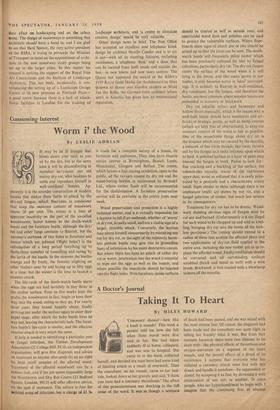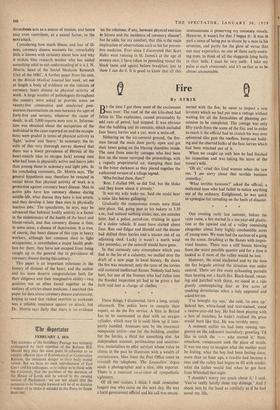A Doctor's Journal
Taking It To Heart
By MILES HOWARD
of death had been passed, and she was seized with the most intense fear. Of course, the diagnosis had been made and the consultant was quite right in telling her frankly what it was. But from that moment forwards there. were two illnesses to be dealt with : the physical effects of thrombosis and oxygen-starvation on a segment of the heart muscle, and the mental effects of a dread of its recurrence. I suppose that everyone who has suffered a coronary attack must live with this dread, and handle it somehow—by suppression or denial, by accepting it as fate, by drowning it with intoxication of one sort or another. In some people, who are hypochondriacal to begin with, I imagine that the continuing fear of another thrombosis acts as a source of tension, and hence may even contribute, as a causal factor, to the next attack.
Considering how much illness, and fear of ill- ness, coronary disease accounts for, remarkably little is known with certainty about how and why it strikes. One research worker who has added something solid to our understanding of it is J. N. Morris, head of the Social Medicine Research Unit of the MRC. A further paper from his unit, in the British Medical Journal last week, set out at length a body of evidence on the relation of coronary heart disease to physical activity of work. A large number of pathologists throughout the country were asked to provide notes on twenty-five consecutive and unselected post- mortem examinations on men between the ages of forty-five and seventy, whatever the cause of death; in all, 5,000 reports were sent in. Informa- tion was obtained about the occupation of the individual in the cases reported on and the occupa- tions were graded in terms of physical activity as 'light,' active' and 'heavy.' In summary, the re- sults of this very thorough survey showed that there was a lower prevalence of fibrosis of the heart-muscle (due to oxygen lack) among men who had been in physically active and heavy jobs than among those in sedentary and light jobs. In his concluding comments, Dr. Morris says, 'The general hypothesis may therefore be restated in causal terms that physical activity of work is a protection against coronary heart disease. Men in active jobs have less coronary disease during middle-life, what disease they have is less severe, and they develop it later than men in physically inactive jobs.' The speculation, he says, may be advanced that habitual bodily activity is a factor in the maintenance of the health of the heart and blood-vessels, and that coronary disease is thus, in some sense, a disease of deprivation. It is true, of course, that heart disease of this type in heavy workers, although less common than in light occupations, is nevertheless a major health prob- lem for them; they have not escaped from being caught up in the general rise in prevalence of coronary disease during this century.
This paper is an important milestone in the history of diseases of the heart, and the author and his team deserve congratulation both for their diligence and their imaginative ability—two qualities not so often found together in the authors of articles about medicine. I searched this paper for data about coronary disease and exercise, hoping to read that violent exertion at weekends was a reliable insurance against an attack, but Dr. Morris says flatly that there is no evidence 'on the relations, if any, between physical exertion in leisure and the incidence of coronary disease'; but he adds, for my comfort, that this is the main implication of observations such as his for preven- tive medicine. Ever since I discovered that Kurt Hahn went running in St. James's at the age of seventy-two, I have taken to pounding round the block (now and again) before breakfast, just to show I can do it. It is good to know that all this strenuousness is preserving my coronary vessels. However, it wasn't for that I began it : it was in part a sense of being put to shame by a man in his seventies, and partly for the glow of virtue that one may experience, on one of these early-morn- ing trots, to think of all the sluggards lying lazily in their beds. I must be very unfit : I take my pulse at each crossroads, and it's so fast as to be almost uncountable.











































 Previous page
Previous page